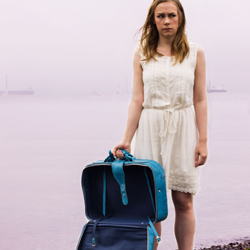Eurydice - Smart, Elegant, A Bit Too Nice

Eurydice, while not a searing production, was a rare treat. The play by lauded American playwright, Sarah Ruhl, is one part nostalgic fable, one part modern comedy, with some gentle nods to ancient Greek theatre. There’s a touch of the absurd in the script - stones who speak in chorus, a devil who rides a tricycle, an underworld hotel room made out of string. The language is poetic yet clean, and there’s something about the crisp dialogue, a minimalist back and forth, that takes the scenes into a heightened magical realm while still feeling utterly modern.
In fact the strongest part of this show was the script, which is undeniably brilliant. Ruhl is considered one of America’s most promising playwrights, having won a MacArthur Fellowship worth over half a million dollars before hitting the age of 40, and you can tell why when you sit in a darkened theatre and just listen to the words she has written.
One thing that might have held this production down was an excessive, though understandable, reverence for the playwright - reverence has a tendency to settle us into a place of quiet introspection - something which deeply hinders the production of riveting theatre. If the actors are to take ownership of the lines and become the characters, they must forget the greatness of the playwright and focus only on meaning - the context of the characters, their wants and needs, the colours that make up their lives.
While there were some beautiful moments of truth and casual realism in the show, the actors, despite clearly possessing deep wells of talent, were often unable to connect to the seething passion underneath Ruh’s minimalist lines.
The play, based on the Greek mythology of Orpheus whose wife Eurydice tragically finds herself alone in the underworld on her wedding night, requires of its actors a kind of quiet understanding of love, loss, fear and desperation in order for it to work. Otherwise it stays in the realm of pretty, lovely, and interesting, unable to captivate the audience and cultivate the empathy and catharsis we are yearning to feel.
The actors, all of whom are young recent graduates of theatre school, were perhaps not quite ready to go to the darkest places of their psyche with this play. One criticism of Canadian actors is that we’re too nice - our work stays in the realm of polite and respectful because that’s who we are. But in the theatre, there’s no room for that. Stories come from conflict, from one character’s deep desire to have a different experience of life, to get what they want. But in this production the character’s needs felt like mere wants, as though it would be nice if they could get what they wanted but it wasn’t vital.
However, their work was clean and elegant, and all of the actors involved show great promise. Julie Casselman was particularly engaging as Eurydice. Her simplicity and physical ease made her enjoyable to watch.
It would be interesting to see this show produced again in ten years time with the exact same cast, crew and director. After having lived more, seen more, and found a way to connect more deeply in their work to the pain and anguish that so often defines the human experience, I’m sure they could turn this into a stunning piece of theatre.
Director Eleanor Felton, who graduated from Trinity Western University in 2014, is definitely someone to watch. If this is the level of artistry she is capable of producing less than two years into her career, I look forward to seeing more of her work in years to come.



